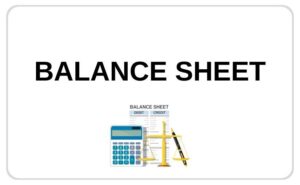![]()
Balance Sheet for the Chemists
Ensuring accurate financial representation in a balance sheet for the chemists is crucial for maintaining transparency, complying with regulations, and making informed financial decisions.
Here’s how to achieve this:
1. Proper Documentation and Recording:
To begin with, chemists should maintain meticulous records of all financial transactions. This includes invoices, receipts, purchase orders, and sales records.
These documents serve as evidence for the various financial activities that take place within the business.
2. Categorization and Classification:
Accurate financial representation requires that all transactions are appropriately categorized and classified.
For chemists, this could mean separating expenses into categories such as raw materials, laboratory equipment, operating expenses, and employee salaries.
Proper categorization allows for a clear understanding of where the money is coming from and where it’s going.
3. Regular Reconciliation:
Reconciling financial records on a regular basis is essential. Chemists should ensure that their actual financial records match up with their bank statements, invoices, and other financial documents. Any discrepancies should be investigated and resolved promptly.
4. Accrual Accounting:
Accrual accounting aligns revenue and expenses with their occurrence, irrespective of cash transactions.
This approach provides a more accurate representation of a chemist’s financial health, especially for long-term projects or contracts.
5. Asset and Liability Assessment:
Chemists should regularly assess their assets (inventory, equipment, etc.) and liabilities (outstanding payments, loans, etc.) to ensure these are accurately valued and reported on the balance sheet.
6. Depreciation and Amortization:
For chemists with significant equipment and assets, factoring in depreciation and amortization is important.
These accounting methods spread the cost of long-term assets over their useful lifespans, providing a more accurate representation of their value.
7. Accurate Valuation of Inventory:
Chemists dealing with inventory need to ensure accurate valuation, as it directly affects the cost of goods sold and overall financial health.
Different valuation methods (FIFO, LIFO, etc.) can impact financial statements differently.
8. Liabilities and Contingencies:
Chemists should also consider any potential liabilities or contingencies that might impact their financial standing. This includes potential legal claims or pending litigation.
9. Engagement of Professional Help:
Engaging with an accountant or financial advisor who specializes in the industry can provide invaluable guidance. They can help navigate the intricacies of financial reporting, tax regulations, and ensure compliance.
10. Regular Internal Audits:
Periodic internal audits can help identify discrepancies or errors in financial records. These audits can be conducted by an internal team or a third-party audit firm.
In summary, achieving accurate financial representation in a balance sheet for chemists requires meticulous record-keeping, proper categorization, regular reconciliation, adherence to accounting principles, and possibly seeking professional assistance. This approach enhances transparency, fosters informed decision-making, and ensures compliance with financial regulations.
To visit: https://www.mca.gov.in/

For further details access our website: https://vibrantfinserv.com
